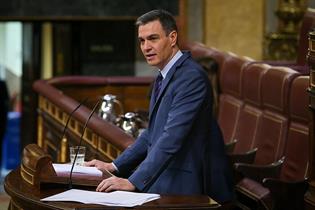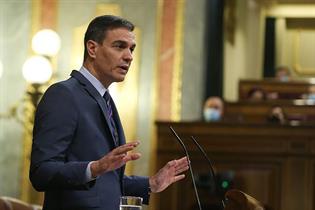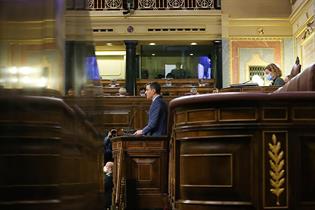Pedro Sánchez says the Government of Spain will respond to Putin's war with "justice, determination and the greatest possible unity"
President's News - 2022.3.30
Lower House of Parliament, Madrid
The President of the Government of Spain has assured that the Government will act in the same way as it has managed the COVID-19 crisis over the last two years in the face of Ukraine's invasion.
In the face of such "painful and costly" situations, especially for the most vulnerable, the question is how to respond, "and we have already decided in the pandemic and we reaffirm ourselves in the face of war: with justice, with determination and with the greatest possible unity", he said in his appearance before the plenary session of Congress to report on the latest meetings of the European Council and NATO and relations with Morocco.
Pedro Sanchez reiterated during his speech the need to "put aside quarrels and sectarianism and join forces" to protect Ukraine, to stop the attack by Russia's President Vladimir Putin against the European project and to protect well-being on a global and national scale.
"If it is not now, at this very moment, with a pandemic and a war in Europe, when our health is under attack by a virus and our way of living by a tyrant, the question that we should be asking ourselves and that the Spanish people are legitimately asking themselves is: When will we then also send out a message of resounding unity in this Chamber?
Proportionate and prudent measures in defence of peace
This unity, Sánchez argued, has been achieved in the Atlantic Alliance, which after the invasion of Ukraine activated its plans and reinforced its eastern flank. In this framework, it has been decided to establish four new Task Forces, in Bulgaria, Slovakia, Hungary and Romania.
Sánchez has described all measures taken by NATO as "preventive, proportionate and prudent". Regarding Spain's supply of arms to the resistance and the Ukrainian military, he pointed out that "in the face of any aggression, all weaponry is defensive".
 Pool CongresoPutin's war reminded Europeans of "how important it is to defend peace", of the need to strengthen borders together and of the fundamental value of deterrence, alongside diplomatic efforts. Sánchez stressed that the NATO Summit in Madrid in June will be used to set the Alliance's new strategy until 2030.
Pool CongresoPutin's war reminded Europeans of "how important it is to defend peace", of the need to strengthen borders together and of the fundamental value of deterrence, alongside diplomatic efforts. Sánchez stressed that the NATO Summit in Madrid in June will be used to set the Alliance's new strategy until 2030.
Furthermore, the head of the Executive has advocated investing 2% of Gross Domestic Product (GDP) in Defence, an increase that should be "progressive" and in line with social priorities. This investment effort - he pointed out - corresponds to that announced by many allied countries and is not "any militaristic fickleness", but a way of "defending our democracy and our peace" from their enemies.
Reducing energy prices
The war, said Sánchez, has also made Europe aware of the risk of depending on Russia for gas, oil and coal supplies, as well as the need to move towards energy security in its twofold aspect: security of supply and affordable prices. Ending this dependence as soon as possible was what the EU decided at the Versailles Summit on 10-11 March, a position reiterated at last week's European Council.
The head of the Executive stated that this Council was a "turning point" as Spain and Portugal were recognised as "energy islands", which will allow temporary and exceptional measures to be implemented to reduce electricity prices for consumers and companies. This week the Government will send its initiatives to the European Commission, according to Sánchez, who is convinced that it will urgently confirm that they are in line with European law.
The last European Council meeting, Sánchez added, also showed the consensus on the need to increase the defence budget of member states and to strengthen the Union's food autonomy.
Preserving growth and job creation
 Pool CongresoAt a national level, the president said that the Government cannot prevent the war from having an impact on the Spanish economy, "but we can promise that we will do our utmost to mitigate its effects on the population as much as possible" and "we will distribute the sacrifices in a balanced manner so that no sector or family, especially the most vulnerable, will feel neglected or abandoned to their fate".
Pool CongresoAt a national level, the president said that the Government cannot prevent the war from having an impact on the Spanish economy, "but we can promise that we will do our utmost to mitigate its effects on the population as much as possible" and "we will distribute the sacrifices in a balanced manner so that no sector or family, especially the most vulnerable, will feel neglected or abandoned to their fate".
Pedro Sánchez outlined the Action Plan for Responding to the War approved yesterday by the Council of Ministers, which includes aid for families, workers and the economic and business fabric, as well as measures in the areas of transport, cybersecurity and energy, with the aim of protecting the most affected sectors and citizens, distributing the effects of the invasion fairly and preserving the path of growth and job creation as much as possible. If the war in Ukraine drags on and has other consequences, "the Government will not hesitate to act again", he said.
With regard to the displaced persons and refugees from Ukraine who are arriving in Spain, the president pointed out that the Executive will allocate the necessary resources for their reception and that, in addition to the three existing centres (in Madrid, Barcelona and Alicante), another will soon be added in Malaga. More than 27,000 refugees have already applied for temporary protection in Spain, and more than 13,000 places have been taken up in the national reception system.
New phase in relations with Morocco
Relations between Spain and Morocco constituted another pillar of the president's appearance, and he reiterated the Government's desire to open a new stage with a "clear and ambitious" roadmap that contributes to stability, prosperity and security.
Pedro Sánchez has framed this decision within the framework of the two fundamental objectives of the Executive's foreign policy: the defence of Spain's interests and action within the coordinates of the European Union and the multilateral order expressed in the United Nations resolutions.
 Pool CongresoIn the president's opinion, there is no turning point in relations with Morocco, but rather a "further step" along a path that began 14 years ago when the Government of Spain received the Moroccan proposal for autonomy for the Saharawis as a "valuable contribution to overcoming an entrenched conflict".
Pool CongresoIn the president's opinion, there is no turning point in relations with Morocco, but rather a "further step" along a path that began 14 years ago when the Government of Spain received the Moroccan proposal for autonomy for the Saharawis as a "valuable contribution to overcoming an entrenched conflict".
Sánchez also stressed that Spain would continue to offer humanitarian support to the Sahrawi people and would "actively" back the work of the new personal envoy of the UN Secretary-General for Western Sahara, Staffan de Mistura, to resume negotiations on the conflict.
Non official translation





